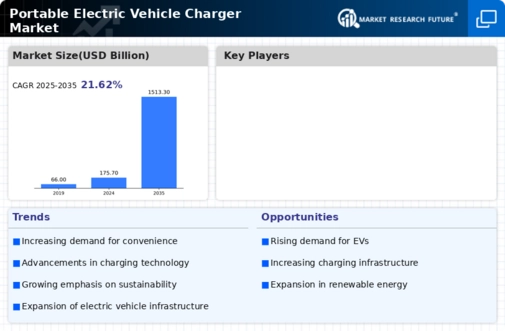Global Portable Electric Vehicle Charger, By Type Outlook (USD Million, 2018-2032)
Gas-fuelled Charger
Battery EV Charger
Global Portable Electric Vehicle Charger, By Current Type (USD Million, 2018-2032)
AC
DC
Global Portable Electric Vehicle Charger, By End-user (USD Million, 2018-2032)
Electric Vehicles
Commercial Car
Passenger Car
Aviation
Others
Roadside Assistance Companies
Utilities
Shared Fleet Operator
Others
North America Portable Electric Vehicle Charger, By Type Outlook (USD Million, 2018-2032)
Gas-fuelled Charger
Battery EV Charger
North America Portable Electric Vehicle Charger, By Current Type (USD Million, 2018-2032)
AC
DC
North America Portable Electric Vehicle Charger, By End-user (USD Million, 2018-2032)
Electric Vehicles
Commercial Car
Passenger Car
Aviation
Others
Roadside Assistance Companies
Utilities
Shared Fleet Operator
Others
US Portable Electric Vehicle Charger, By Type Outlook (USD Million, 2018-2032)
Gas-fuelled Charger
Battery EV Charger
US Portable Electric Vehicle Charger, By Current Type (USD Million, 2018-2032)
AC
DC
Electric Vehicles
Commercial Car
Passenger Car
Aviation
Others
Roadside Assistance Companies
Utilities
Shared Fleet Operator
Others
Canada Portable Electric Vehicle Charger, By Type Outlook (USD Million, 2018-2032)
Gas-fuelled Charger
Battery EV Charger
Canada Portable Electric Vehicle Charger, By Current Type (USD Million, 2018-2032)
AC
DC
Electric Vehicles
Commercial Car
Passenger Car
Aviation
Others
Roadside Assistance Companies
Utilities
Shared Fleet Operator
Others
Mexico Portable Electric Vehicle Charger, By Type Outlook (USD Million, 2018-2032)
Gas-fuelled Charger
Battery EV Charger
Mexico Portable Electric Vehicle Charger, By Current Type (USD Million, 2018-2032)
AC
DC
Electric Vehicles
Commercial Car
Passenger Car
Aviation
Others
Roadside Assistance Companies
Utilities
Shared Fleet Operator
Others
Europe Portable Electric Vehicle Charger, By Type Outlook (USD Million, 2018-2032)
Gas-fuelled Charger
Battery EV Charger
Europe Portable Electric Vehicle Charger, By Current Type (USD Million, 2018-2032)
AC
DC
Europe Portable Electric Vehicle Charger, By End-user (USD Million, 2018-2032)
Electric Vehicles
Commercial Car
Passenger Car
Aviation
Others
Roadside Assistance Companies
Utilities
Shared Fleet Operator
Others
Germany Portable Electric Vehicle Charger, By Type Outlook (USD Million, 2018-2032)
Gas-fuelled Charger
Battery EV Charger
Germany Portable Electric Vehicle Charger, By Current Type (USD Million, 2018-2032)
AC
DC
Electric Vehicles
Commercial Car
Passenger Car
Aviation
Others
Roadside Assistance Companies
Utilities
Shared Fleet Operator
Others
UK Portable Electric Vehicle Charger, By Type Outlook (USD Million, 2018-2032)
Gas-fuelled Charger
Battery EV Charger
UK Portable Electric Vehicle Charger, By Current Type (USD Million, 2018-2032)
AC
DC
Electric Vehicles
Commercial Car
Passenger Car
Aviation
Others
Roadside Assistance Companies
Utilities
Shared Fleet Operator
Others
France Portable Electric Vehicle Charger, By Type Outlook (USD Million, 2018-2032)
Gas-fuelled Charger
Battery EV Charger
France Portable Electric Vehicle Charger, By Current Type (USD Million, 2018-2032)
AC
DC
Electric Vehicles
Commercial Car
Passenger Car
Aviation
Others
Roadside Assistance Companies
Utilities
Shared Fleet Operator
Others
Rest of Europe Portable Electric Vehicle Charger, By Type Outlook (USD Million, 2018-2032)
Gas-fuelled Charger
Battery EV Charger
Rest of Europe Portable Electric Vehicle Charger, By Current Type (USD Million, 2018-2032)
AC
DC
Electric Vehicles
Commercial Car
Passenger Car
Aviation
Others
Roadside Assistance Companies
Utilities
Shared Fleet Operator
Others
Asia-Pacific Portable Electric Vehicle Charger, By Type Outlook (USD Million, 2018-2032)
Gas-fuelled Charger
Battery EV Charger
Asia-Pacific Portable Electric Vehicle Charger, By Current Type (USD Million, 2018-2032)
AC
DC
Asia-Pacific Portable Electric Vehicle Charger, By End-user (USD Million, 2018-2032)
Electric Vehicles
Commercial Car
Passenger Car
Aviation
Others
Roadside Assistance Companies
Utilities
Shared Fleet Operator
Others
China Portable Electric Vehicle Charger, By Type Outlook (USD Million, 2018-2032)
Gas-fuelled Charger
Battery EV Charger
China Portable Electric Vehicle Charger, By Current Type (USD Million, 2018-2032)
AC
DC
Electric Vehicles
Commercial Car
Passenger Car
Aviation
Others
Roadside Assistance Companies
Utilities
Shared Fleet Operator
Others
Japan Portable Electric Vehicle Charger, By Type Outlook (USD Million, 2018-2032)
Gas-fuelled Charger
Battery EV Charger
Japan Portable Electric Vehicle Charger, By Current Type (USD Million, 2018-2032)
AC
DC
Electric Vehicles
Commercial Car
Passenger Car
Aviation
Others
Roadside Assistance Companies
Utilities
Shared Fleet Operator
Others
India Portable Electric Vehicle Charger, By Type Outlook (USD Million, 2018-2032)
Gas-fuelled Charger
Battery EV Charger
India Portable Electric Vehicle Charger, By Current Type (USD Million, 2018-2032)
AC
DC
Electric Vehicles
Commercial Car
Passenger Car
Aviation
Others
Roadside Assistance Companies
Utilities
Shared Fleet Operator
Others
Rest of Asia Pacific Portable Electric Vehicle Charger, By Type Outlook (USD Million, 2018-2032)
Gas-fuelled Charger
Battery EV Charger
Rest of Asia Pacific Portable Electric Vehicle Charger, By Current Type (USD Million, 2018-2032)
AC
DC
Electric Vehicles
Commercial Car
Passenger Car
Aviation
Others
Roadside Assistance Companies
Utilities
Shared Fleet Operator
Others
Rest of the World Portable Electric Vehicle Charger, By Type Outlook (USD Million, 2018-2032)
Gas-fuelled Charger
Battery EV Charger
Rest of the World Portable Electric Vehicle Charger, By Current Type (USD Million, 2018-2032)
AC
DC
Rest of the World Portable Electric Vehicle Charger, By End-user (USD Million, 2018-2032)
Electric Vehicles
Commercial Car
Passenger Car
Aviation
Others
Roadside Assistance Companies
Utilities
Shared Fleet Operator
Others
Middle East and Africa Portable Electric Vehicle Charger, By Type Outlook (USD Million, 2018-2032)
Gas-fuelled Charger
Battery EV Charger
Middle East and Africa Portable Electric Vehicle Charger, By Current Type (USD Million, 2018-2032)
AC
DC
Electric Vehicles
Commercial Car
Passenger Car
Aviation
Others
Roadside Assistance Companies
Utilities
Shared Fleet Operator
Others
South America Portable Electric Vehicle Charger, By Type Outlook (USD Million, 2018-2032)
Gas-fuelled Charger
Battery EV Charger
South America Portable Electric Vehicle Charger, By Current Type (USD Million, 2018-2032)
AC
DC
Electric Vehicles
Commercial Car
Passenger Car
Aviation
Others
Roadside Assistance Companies
Utilities
Shared Fleet Operator
Others




Leave a Comment